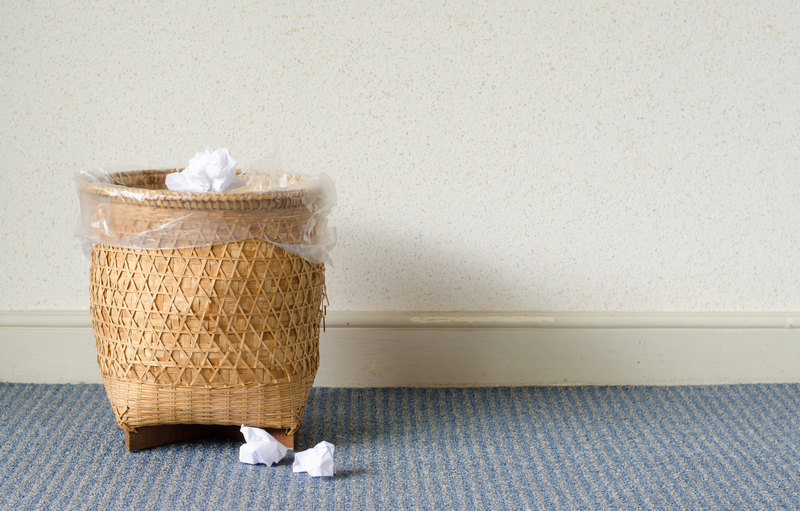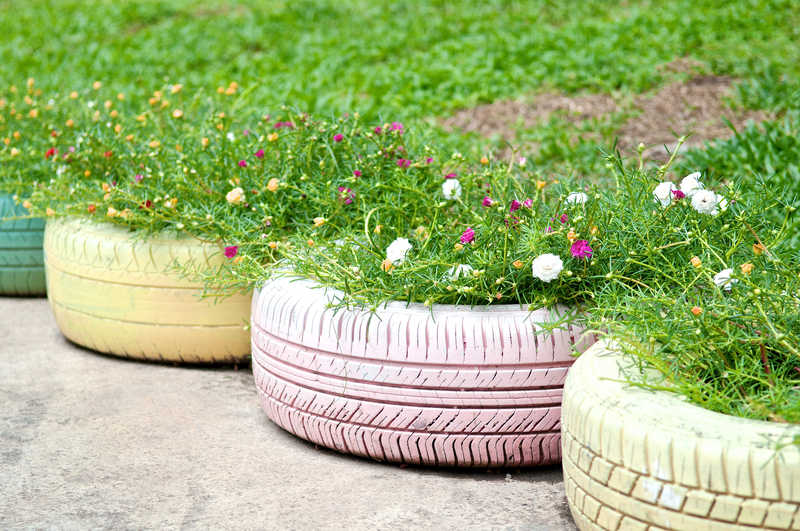Maximize Your Savings When Handling Bulky Waste Items
Dealing with large, unwanted items can be a daunting and expensive task for homeowners, tenants, and businesses alike. Whether you are renovating, moving, decluttering, or simply looking to get rid of old furniture and appliances, disposing of bulky waste items can quickly become overwhelming--and costly. However, with careful planning and the right strategies, you can save both money and time when handling bulky waste items. In this comprehensive guide, we share actionable tips and insights to maximize your savings and manage large waste efficiently and responsibly.
Understanding Bulky Waste Items
Before jumping into the money-saving strategies, it's crucial to clarify what qualifies as "bulky waste items." Typically, these include objects too large for regular curbside collection or standard bins, such as:
- Sofas, couches, and armchairs
- Mattresses and bed frames
- Large appliances (refrigerators, washing machines, ovens)
- Wardrobes, dressers, and shelves
- Carpets and rugs
- Garden waste and outdoor furniture
- Construction debris (doors, windows, bathtubs)
Understanding what counts as large waste will help you explore the best disposal and savings options available in your area.

Why Proper Management of Bulky Waste Matters
Directing attention to the proper handling of bulky items is crucial for several reasons:
- Environmental impact: Many large items can be recycled or repurposed, reducing landfill waste.
- Cost efficiency: Indiscriminate disposal can be expensive, whereas strategic approaches can dramatically lower expenses.
- Community well-being: Proper disposal prevents illegal dumping, keeping neighborhoods cleaner and safer.
Assess Your Bulky Waste Items First
Before getting quotes or booking removals, evaluate every large item you wish to dispose of. Consider:
- Condition: Is the item still usable, or only partially damaged?
- Material: Can it be recycled (e.g., metal, wood, or fabric)?
- Local disposal options: Are there special facilities for certain types of waste, such as electronics or mattresses?
Often, items in good condition can be donated or sold rather than trashed--an easy way to save money or even earn some back!
Cost-Effective Strategies for Managing Bulky Waste
1. Sell or Donate Usable Items
One of the most effective ways to save money on bulky waste disposal is to avoid traditional disposal altogether. Take these steps:
- Sell online: Use platforms like Craigslist, Facebook Marketplace, OfferUp, or eBay for large items in decent shape. Many people seek secondhand furniture or appliances, and you may profit instead of paying disposal fees.
- Donate locally: Charities such as Goodwill, The Salvation Army, and local shelters often accept furniture and appliances. Some even offer free pickup, eliminating haulage costs and benefiting the community.
- Give away: If selling isn't an option, use "freecycle" networks, or simply place items curbside with a "Free" sign (check local ordinances first).
By prioritizing reuse, you make a positive environmental impact and keep money in your pocket.
2. Leverage Local Municipal Bulk Waste Pickup
Many towns and cities have designated days for curbside collection of bulk waste items--often at little or no cost to residents. Here's how you can maximize your savings:
- Check schedules: Find out when your municipality collects bulky items and what restrictions might apply.
- Register in advance: Some services require booking slots or registering specific items.
- Abide by rules: Follow size, weight, and accepted item guidelines to avoid extra fees or fines.
- Consolidate waste: Wait until you have several items for disposal to make the most of your collection allowance.
*Tip:* City pickup services are typically included in your property taxes or utility bills, so taking advantage of them is a key way to manage large waste economically.
3. DIY Drop-Off at Waste Facilities
If local collection isn't available or is too infrequent, look for transfer stations, recycling centers, or landfills that accept bulky waste. Most facilities charge fees based on:
- Item type (e.g., electronics, mattresses, white goods)
- Volume and weight
- Residency status (many offer resident discounts or "free" drop-off days)
*Pro Tip:* Plan your trip so you're disposing of several items at once, or share a vehicle/truck with neighbors to split costs.
4. Upcycling and Repurposing
Another creative way to save is to transform existing waste into new functional items. For example:
- Turn old doors into tables or desks
- Refinish dressers for organization or storage
- Convert pallets into garden planters or furniture
- Use appliances for scrap metal or parts
Upcycling not only prevents landfill waste but also saves you the cost of replacement furnishings. Plus, it's a fantastic green initiative.
5. Rent a Dumpster or Bin - but Share the Cost
For large-scale cleanouts, consider renting a dumpster or a large disposal bin. While it can be pricier, there are tricks to stretching your budget:
- Neighbor Sharing: Coordinate with neighbors, friends, or nearby family members to split rental fees.
- Short-Term Rentals: Only rent for the minimum necessary period to avoid extra charges.
- Pack smart: Break down bulky items so you're not paying for empty space inside the bin.
Many dumpster companies have variable pricing, so shop around and ask about discounts, especially for off-peak times of year.
6. Hire Affordable Removal Services
Sometimes the hassle isn't worth doing it alone. There are many junk removal companies and local haulers that can take bulky items for a fee. Maximize your savings by:
- Getting multiple quotes: Prices can vary significantly; always compare at least three services.
- Reading reviews: Opt for reputable, reliable companies with clear fee structures.
- Booking in bulk: Remove as many items as possible at once to save on per-item or per-trip charges.
- Requesting discounts: Many services offer discounts for seniors, veterans, or first-time customers.
*Insider Tip:* Some companies recycle or donate what they remove, adding extra value.
Reduce Bulky Waste to Lower Costs Long Term
The best way to save money managing bulky waste is to create less of it in the first place. Adopt these preventative practices:
- Choose multi-purpose and durable furniture for your home to reduce frequent replacement.
- Repair rather than replace items whenever possible.
- Consider renting large items for short-term needs, rather than buying.
- Buy secondhand or refurbished goods--these have already avoided landfill once!
Conscious purchasing decisions not only save you money in the long run but also help reduce environmental impact.
Common Mistakes to Avoid (That Can Cost You!)
Even the most budget-savvy waste handlers can make costly errors. Watch out for these common pitfalls:
- Overlooking free services: Not researching thoroughly means missing out on free pickups or volunteer haulers.
- Ignoring disposal laws: Improper dumping or non-compliance with local regulations can result in hefty fines.
- Hauling items individually: Multiple trips by car or truck can waste fuel and money--consolidate loads to minimize costs.
- Paying for unnecessary extras: Some removal companies upcharge for services you don't actually need, such as expedited service or extra labor. Read agreements carefully!
Always confirm what's included when you book any removal or disposal service, and ask about hidden fees.
Environmental and Community Benefits
Beyond cost savings, the way you handle bulky waste items can greatly benefit your community and the planet. Consider these wider impacts:
- Reduced landfill use: The less bulky waste in landfills, the less methane gas is produced, which helps combat climate change.
- Resource recovery: Many large items contain recyclable materials, such as metals, plastics, and textiles.
- Community support: By donating serviceable items, you support families in need and nonprofit organizations.
- Beautified neighborhoods: Properly managed bulky waste reduces blight and increases neighborhood pride.
*Maximizing your savings when handling bulky waste isn't just about the bottom line--it's about stewardship, too.*

Bulky Waste Items: Frequently Asked Questions (FAQs)
Can I get rid of bulky waste for free?
Often, yes! Many municipalities offer free collection days or special drop-off events. Some charities and recycling programs may collect items for free if they are reusable. Always check with your local government or waste authority for options.
What is the cheapest way to dispose of large household items?
Donating, selling, or using municipal pickup are the least expensive options. Disposing of items yourself at a local facility or with a dumpster can be economical if shared with others.
Is illegal dumping really risky?
Absolutely. Apart from environmental damage, illegal dumping carries substantial fines and penalties in most jurisdictions. Always use legal disposal routes.
How can I recycle specific types of bulky waste?
Appliances can typically be recycled at special centers due to refrigerants or electronics. Mattresses, metals, and large plastics are often accepted at recycling centers. Check local guidelines for restrictions and drop-off locations.
Wrap Up: Smart Strategies to Maximize Your Bulky Waste Savings
In summary, maximizing savings when handling bulky waste items hinges on resourcefulness and a willingness to research the best options available. Whether you donate, sell, recycle, upcycle, or leverage municipal services, there are numerous ways to minimize costs and environmental impact.
- Audit what needs disposal and explore reusing, donating, or selling options first.
- Use your city's bulk collection or seek out local recycling events and facilities.
- Look for partnerships with neighbors, friends, or removal companies to split costs.
- Avoid common mistakes by reading rules, bundling loads, and querying hidden fees.
- Make reducing bulky waste a household policy to save even more over time.
By following these tips, you'll ensure that you not only save money on bulky waste disposal but also contribute positively to your community and the environment. Next time you face a garage cleanout, renovation, or move, remember that a little planning can save you big--both in cash and in conscience!
Take control of your waste, maximize your savings, and become part of a cleaner, greener future today!